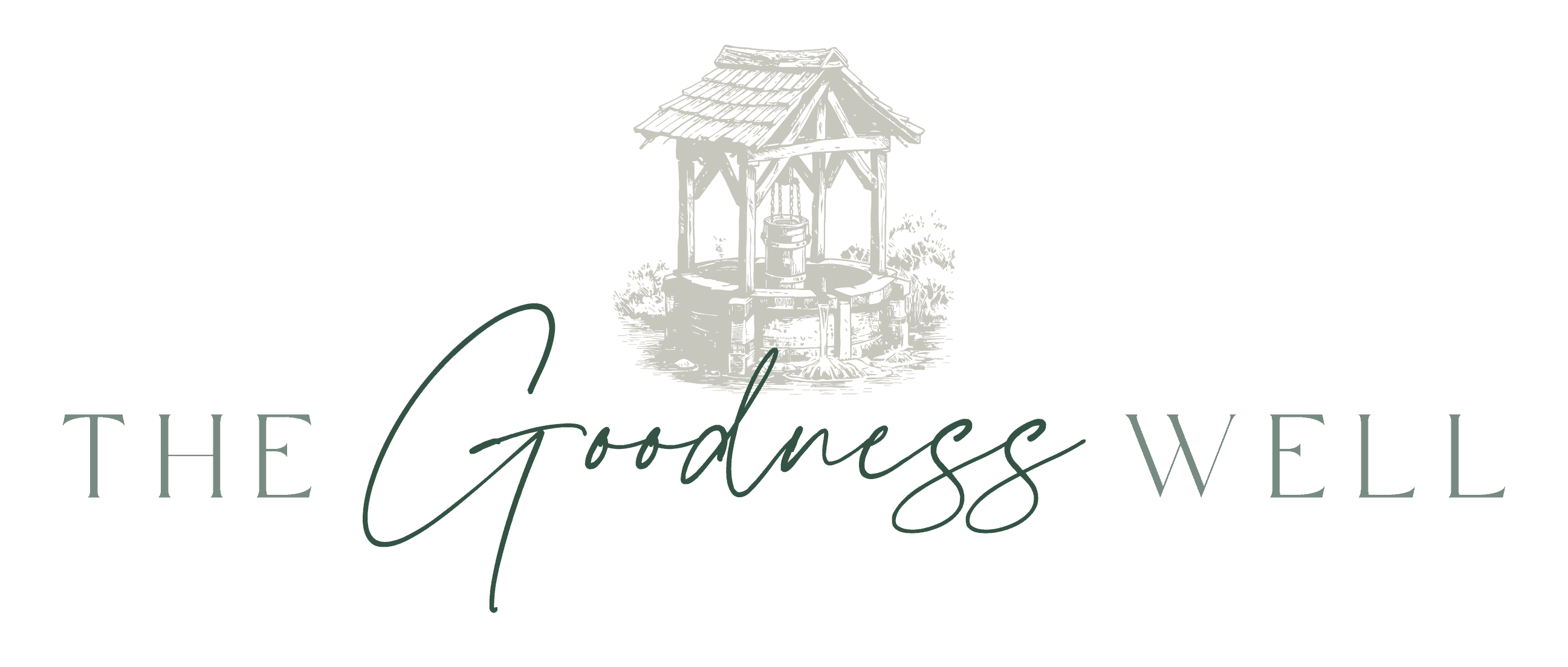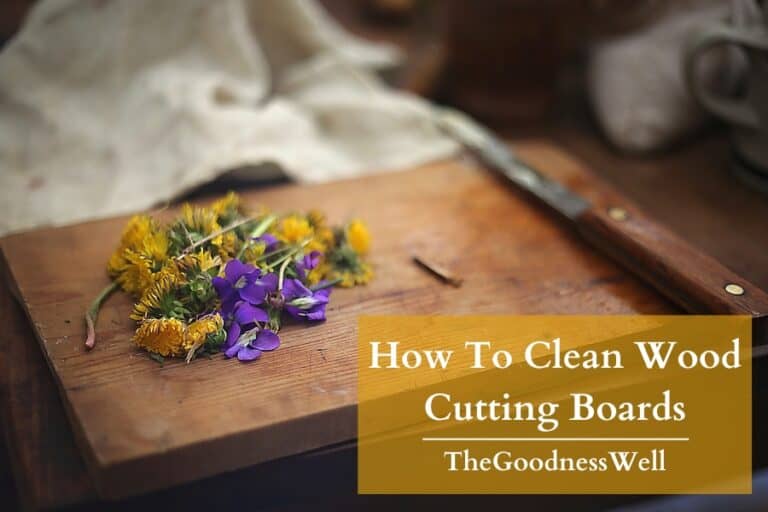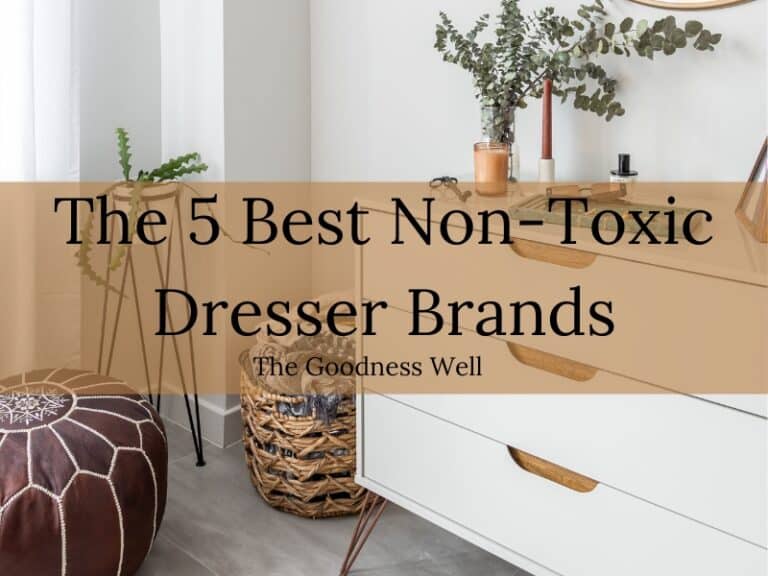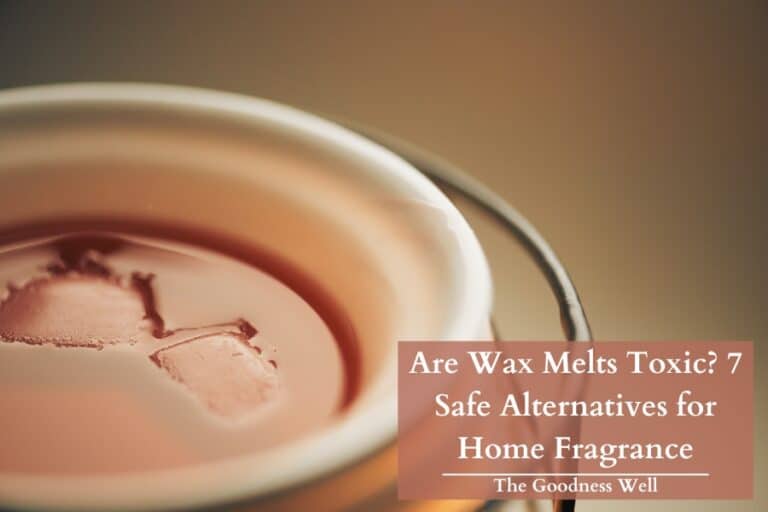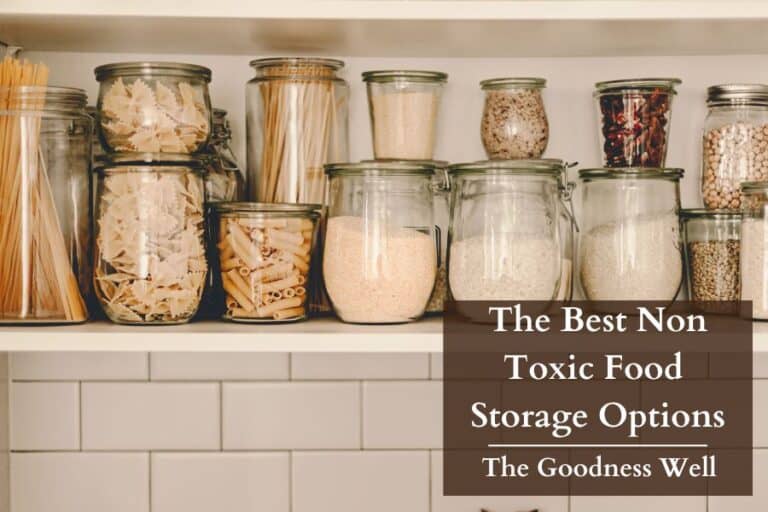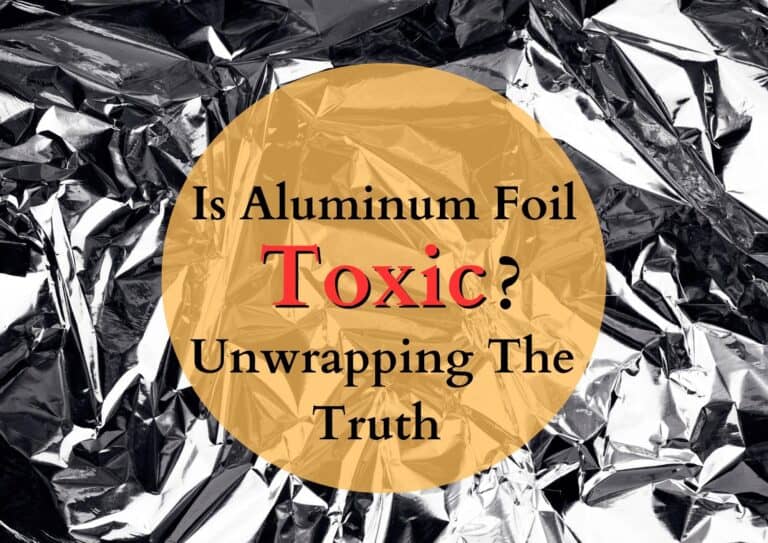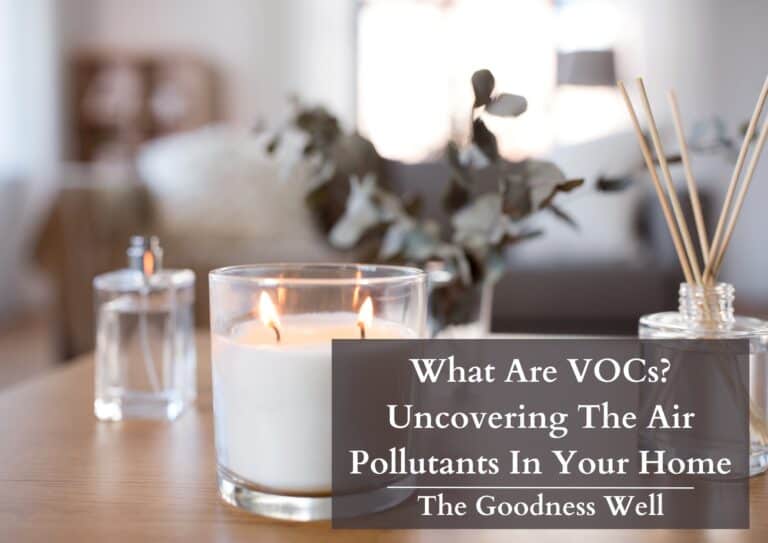What Is Natural Soap? The 7 Reasons to Make The Switch Now
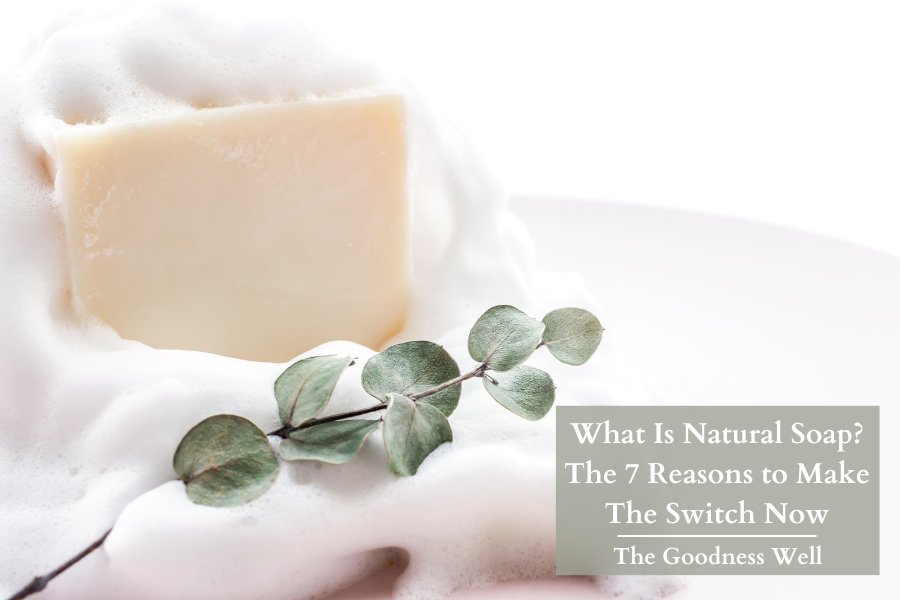
Soap…we use it every day…I mean hopefully lol.
But even with the necessity of soap, most of us rarely check to see what’s in them.
Meanwhile, most soaps on the market are filled with toxic chemicals that can be tough on skin.
I’ve always had sensitive skin and as a child, I had too many skin reactions to count. So to prevent that from happening as an adult or even to my family I’ve turned to natural soaps.
And let me tell you; after switching to non toxic natural soaps, we haven’t looked back.
But what is natural soap exactly, and why exactly should you make the switch?
TL;DR
Natural soap is made with plant-based oils and free of harsh chemicals like surfactants, fragrances, and dyes.
7 Key Benefits of Natural Soap are:
- Gentle on Skin
- No Harsh Chemicals
- Great For Dry Skin
- Therapeutic
- DIY Potential
- Eco-Friendly Choice
- Support Small Businesses
Natural Soap 101
Natural soap is made with simple, earth-made ingredients.
You won’t find any toxic chemicals or harmful ingredients that could irritate your skin or jeopardize your health
Unlike commercial options filled with synthetic detergents, dyes, and parabens, natural soaps are kinder to your skin and the environment.
Here are a few of the most common natural soap ingredients as well as their purpose.
| Ingredient | Purpose |
|---|---|
| Oils and Butters | These are the base ingredients of natural soap that provide moisturizing and lather abilities. Common types are; coconut oil, olive oil, palm oil, shea butter, and castor oil. |
| Lye (Sodium Hydroxide or Potassium Hydroxide) | Essential for the saponification process, which turns oils and butters into soap. In the finished product, there’s no lye left after it’s reacted with the oils |
| Essential Oils | A natural way to fragrance soaps that can have therapeutic benefits |
| Botanicals and Herbs | Add texture, color, and benefits to the soap. For example, oatmeal for gentle exfoliation, chamomile for soothing, or activated charcoal for detoxifying |
| Natural Exfoliants | Such as ground apricot kernels, poppy seeds, or coffee grounds, used to add texture and exfoliate |
| Clays | Like kaolin or bentonite, used for color, and detoxifying abilities |
| Honey, Glycerin, and Aloe Vera | Attracts moisture to the skin, making the soap even more moisturizing |
| Natural Colorants | Like spirulina, annatto, and turmeric, used to add color to the soap without synthetic dyes. |
| Milk (Goat’s Milk, Almond Milk, etc.) | Adds creaminess and extra moisturizer to the soap. |
Just check out this comparison of toxic Dove Body wash and Dr. Bronner’s non toxic soap.
I mean the length of Dove’s ingredients list alone is enough to keep me away!!👎🏽
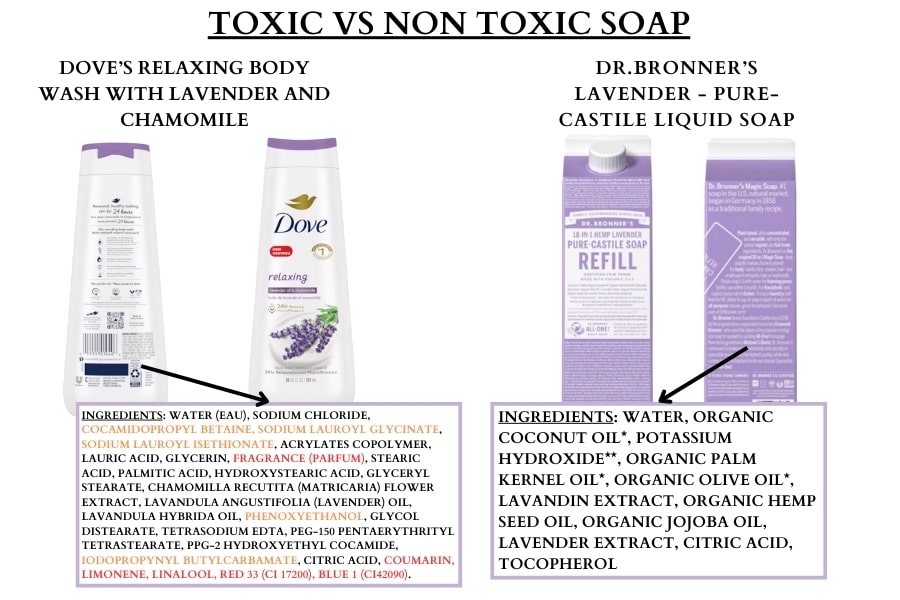
The 7 Key Benefits of Natural Soap
Here are just some of the many reasons you should switch to natural soaps:
1. Gentle on Skin
As someone who has struggled all their life with sensitive skin, I know how important every product from your face moisturizer to your body wash is.
Everything you put on your body plays a major role in the health and feel of your skin.
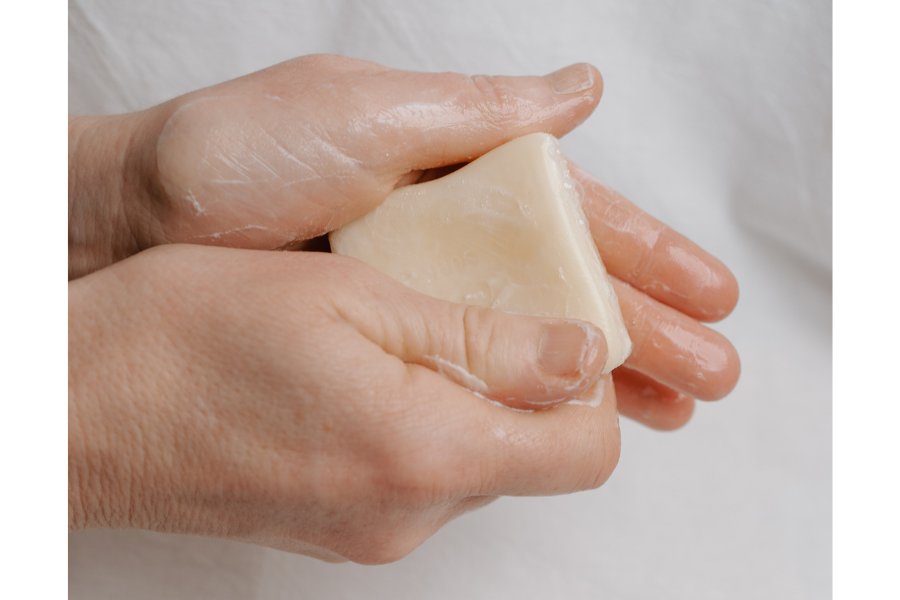
I’ve experienced breakouts and rashes, itchiness, and hives…and that’s why I stopped using traditional soaps because they were doing more harm than good for the skin.
Unlike conventional soaps packed with harsh detergents and artificial fragrances that dry out and irritate your skin, natural soaps are made with plant-based oils and butter that are made to nourish and moisturize your skin without stripping its natural oils.
Because it’s made with more gentle ingredients, natural soap is perfect for every skin type dry oily, and even us sensitive skin folks!
2. No Harsh Chemicals
Now about those harsh chemicals…🙄
Most basic soaps out there contain chemicals that are more harsh on your skin than most people realize.
Not only do they compromise the health of your skin but some ingredients can cause serious health issues.
| Ingredient | Purpose | Health Concern |
|---|---|---|
| Surfactants | Used in cleaners and personal care products to help remove dirt. | Can cause skin and eye irritation, allergic reactions and pose risks to the environment. |
| Fragrances and Perfumes | Added to give scents to products | Can lead to allergic reactions, skin irritation, and respiratory issues, and is problematic for sensitive individuals |
| Preservatives | Extend shelf life by preventing microbial growth. | Some, like parabens, can cause allergic reactions and have been linked to more serious health concerns, including potential hormonal disruptions. |
| pH Modifiers | Adjust product acidity or alkalinity for stability and skin compatibility. | Imbalanced pH can strip natural oils or cause skin irritation. |
| Colorants and Dyes | Provide color in products. | Some synthetic colorants are linked to allergic reactions, skin irritation, and potential health risks, including carcinogenic effects |
3. Therapeutic
Natural soaps made with essential oils are aromatherapeutic. I for one love lavender.
I can smell it now…
Lavender has calming properties that help you relax and can even act as a stress reliever after a long day.
Always use organic essential oils to make sure you’re not getting any of the fake stuff.
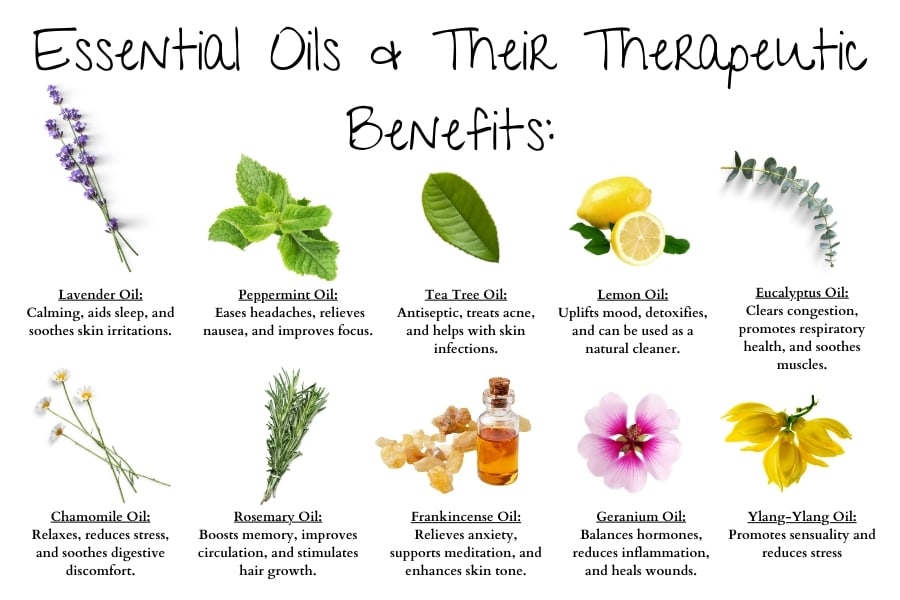
4. Great for Dry Skin
Have you ever got out of the shower and after drying off your skin felt dry and maybe even a bit rough?… I know I have.
Often times it’s because of the soap you use.
But there’s a solution, say goodbye to dry, itchy skin. Natural soaps are naturally moisturizing, thanks to the presence of glycerin, a byproduct of the soap-making process.
Plus there’s none of that dry residue feeling you get when you use some soaps made with preservatives and unnecessary chemicals.
Once I started using natural soaps, I immediately noticed the difference! Just more evidence that those basic soaps were drying out my skin.
5. Eco-Friendly Choice
It’s probably not much of a surprise that ingredients unhealthy for us aren’t safe for the environment either.
On the other hand, ingredients in organic soaps are safe, non toxic, and oftentimes biodegradable, making them safer for you, me, and our planet. 🌍
6. DIY Potential
With conventional soap you kinda don’t have much say in what you get…sure you can pick certain types but beyond that, there isn’t much room for personal preference.
But with natural soaps, you have the chance to make your own soap crafted to meet your preferences and needs!
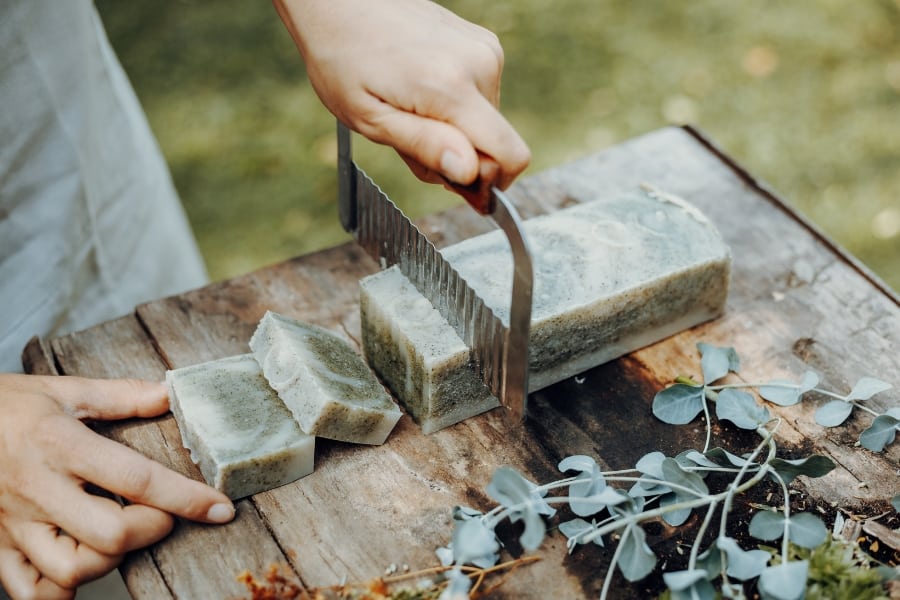
From scent intensity to quantity, style, and ingredients you can DIY natural soaps and get soap made by you and for you.
Sure it might be intimidating at first but it’s much easier than you think and even cost-effective.
Major soap companies don’t know or care about what your skin needs but you have the power to create soap that’s safe and formulated to meet your wants and needs
Here are two non toxic soap recipes to get you started:
Lavender Soap Recipe:
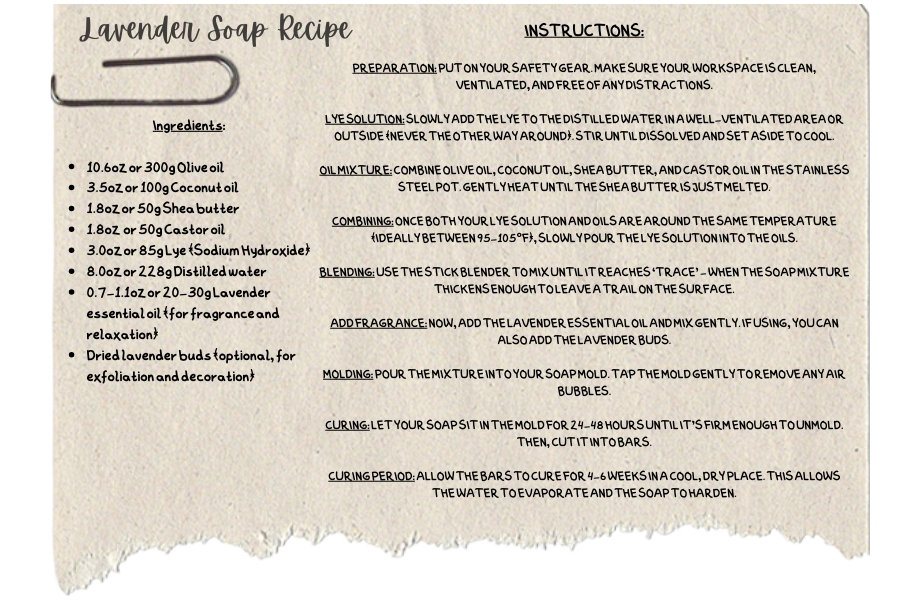
Natural Rosemary Soap Recipe:
7. Support Small Businesses
Not yet ready to make your own soap? That’s okay, you’ll get there.
Until then, shopping small businesses is a great way to find a wide variety of organic soaps while supporting your local economy.
Small businesses actually have some of the safest soaps on the market!
Many of them usually put a lot of care into their products which is why they’re usually better than conventional soaps.
Still, always check ingredients and don’t be afraid to ask questions:)
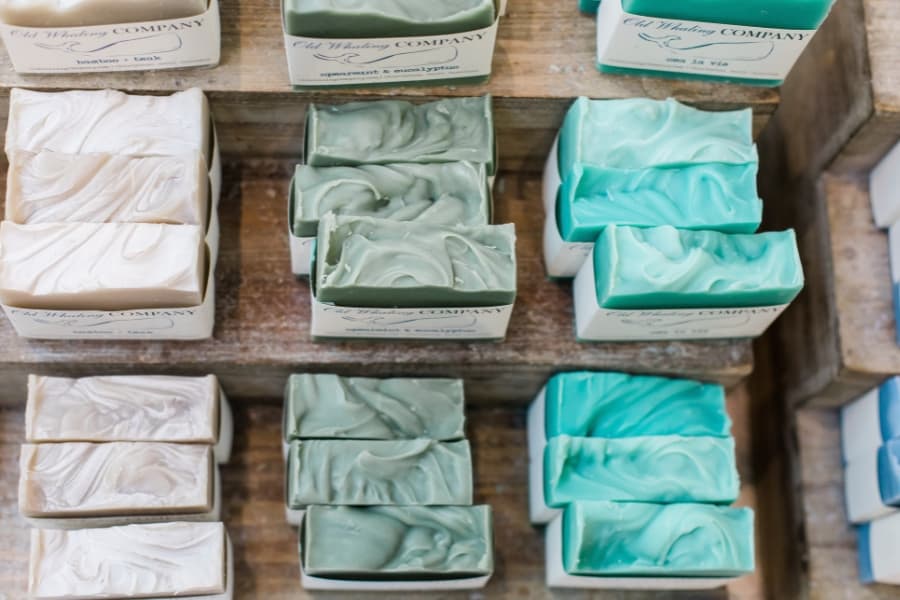
We love finding soaps at our local pop-up shops and markets. You’d be surprised how many different types of combinations there are for natural soap! Soap makers can get pretty creative!
Beware of ‘Natural’ Misuse
Now I know we’ve been saying “natural soap” but just to be transparent, we’re not a fan of the term, ‘natural’ – legally, it’s used pretty loosely.
The FDA isn’t strict with it for cosmetics including soaps.
But they do want labels to be clear, so check out those ingredient lists for anything synthetic.
Also, keep an eye out for certifications like ‘USDA Organic’ or ‘Made Safe’.

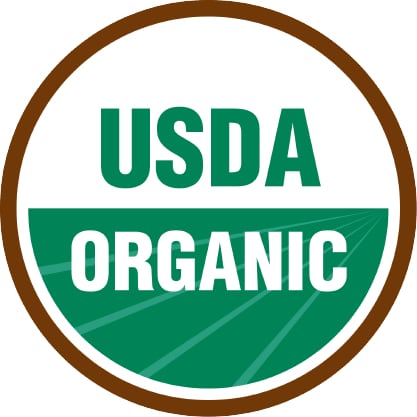
Unfortunately, there are a lot of brands that use the terms “natural” and “organic” but are guilty of greenwashing.
Greenwashing is when a company falsely claims to be eco-friendly or “green” in order to make their products seem more environmentally friendly than they actually are.
It’s a deceptive marketing tactic used to attract consumers without truly being sustainable.
Greenwashing misleads people into thinking they are supporting environmentally responsible and non toxic choices when they may not be.
Just be aware of this when shopping for natural soaps in stores.
Look for brands that are very transparent about what ingredients they use.
You should be able to see a FULL list of ingredients on their site that promote true non-toxic soaps.
We’ll use Dr. Bronners as an example.
Check out the video below and notice how open they are about how they make their products and what’s in them.
So, what is natural soap? It’s a solution.
A non toxic solution to better, healthier, and safer skin.
Always know the ingredients and choose soaps based on your wants and needs but most importantly never settle for toxic “good enough” soap ever again.
Frequently Asked Questions
The gentlest natural soap depends on skin sensitivity, but Castile (olive oil) and goat’s milk are popular choices.
Organic soap is made with certified organic ingredients (no pesticides/fertilizers).
Not all natural soap is more expensive but some definitely are. Natural soap can be more expensive due to the higher quality ingredients, small-batch production, & sustainable practices.
Look for certifications like USDA Organic or Made Safe, plus plant-based ingredients and no harsh chemicals like sulfates or parabens.
